Ores and by products - Study guides, Study notes & Summaries
Looking for the best study guides, study notes and summaries about Ores and by products? On this page you'll find 45 study documents about Ores and by products.
Page 4 out of 45 results
Sort by
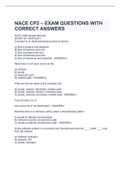
-
NACE CP2 – EXAM QUESTIONS WITH CORRECT ANSWERS
- Exam (elaborations) • 90 pages • 2023
- Available in package deal
-
- R213,53
- + learn more
NACE 2008 Student Manual! START OF CHAPTER 1 Corrosion is an electrochemical process involving A) flow of protons and electrons B) flow of neutrons and ions C) flow of protons and ions D) flow of electrons and ions E) flow of resistance and resistivity - ANSWER-d Metal loss or corrosion occurs at the A) cathode B) anode C) electronic path D) metallic path - ANSWER-b What are the four parts of the corrosion cell A) anode, resistor, electrolyte, metallic path B) anode, c...
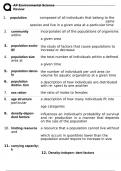
-
AP Environmental Science Review
- Exam (elaborations) • 89 pages • 2023
-
- R259,99
- + learn more
1. population composed of all individuals that belong to the same species and live in a given area at a particular time 2. community incorporates all of the populations of organisms within a given area 3. population ecolo- gy the study of factors that cause populations to increase or decrease 4. population size the total number of individuals within a defined area at a given time 5. population densi- ty 6. population distriu- tion the number of individuals per unit area (or v...
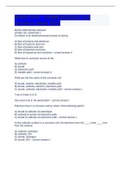
-
NACE CP2 – EXAM question and answers latest 2023
- Exam (elaborations) • 90 pages • 2023
- Available in package deal
-
- R520,17
- + learn more
NACE CP2 – EXAM question and answers latest 2023NACE 2008 Student Manual! START OF CHAPTER 1 Corrosion is an electrochemical process involving A) flow of protons and electrons B) flow of neutrons and ions C) flow of protons and ions D) flow of electrons and ions E) flow of resistance and resistivity d Metal loss or corrosion occurs at the A) cathode B) anode C) electronic path D) metallic path b What are the four parts of the corrosion cell A) anode, resistor,...
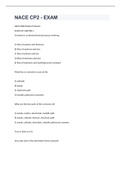
-
NACE CP2 - EXAM 2023 with correct answers
- Exam (elaborations) • 139 pages • 2023
- Available in package deal
-
- R213,53
- + learn more
NACE 2008 Student Manual! START OF CHAPTER 1 Corrosion is an electrochemical process involving A) flow of protons and electrons B) flow of neutrons and ions C) flow of protons and ions D) flow of electrons and ions E) flow of resistance and resistivity d Metal loss or corrosion occurs at the A) cathode B) anode C) electronic path D) metallic path b 00:02 01:29 What are the four parts of the corrosion cell A) anode, resistor, electrolyte, metallic path ...
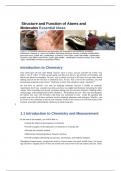
-
Structure and Function of Atoms and Molecules Essential Ideas
- Summary • 54 pages • 2024
-
- R232,12
- + learn more
Structure and Function of Atoms and Molecules Essential Ideas Figure 1.1 Chemical substances and processes are essential for our existence, providing sustenance, keeping us clean and healthy, fabricating electronic devices, enabling transportation, and much more. (credit “left”: modification of work by “vxla”/Flickr; credit “left middle”: modification of work by “the Italian voice”/Flickr; credit “right middle”: modification of work by Jason Trim; credit “right”: ...
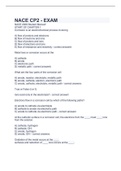
-
NACE CP2 - EXAM 2023 with verified questions and answers
- Exam (elaborations) • 90 pages • 2023
- Available in package deal
-
- R241,41
- + learn more
NACE 2008 Student Manual! START OF CHAPTER 1 Corrosion is an electrochemical process involving A) flow of protons and electrons B) flow of neutrons and ions C) flow of protons and ions D) flow of electrons and ions E) flow of resistance and resistivity d Metal loss or corrosion occurs at the A) cathode B) anode C) electronic path D) metallic path b What are the four parts of the corrosion cell A) anode, resistor, electrolyte, metallic path B) anode, cathode, ...
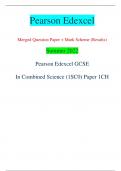
-
Pearson Edexcel Merged Question Paper + Mark Scheme (Results) Summer 2022 Pearson Edexcel GCSE In Combined Science (1SC0) Paper 1CH Centre Number Candidate Number *P69480A0120* Turn over Total Marks Candidate surname Other names
- Exam (elaborations) • 41 pages • 2023
-
- R148,49
- + learn more
Pearson Edexcel Merged Question Paper + Mark Scheme (Results) Summer 2022 Pearson Edexcel GCSE In Combined Science (1SC0) Paper 1CH Centre Number Candidate Number *P69480A0120* Turn over Total Marks Candidate surname Other names Please check the examination details below before entering your candidate information Paper reference You must have: Calculator, ruler Pearson Edexcel Level 1/Level 2 GCSE (9–1) P69480A ©2022 Pearson Education Ltd. Q:1/1/ Instructions •...
This document contains important information on the definitions and descriptions of terminologies in economic geology.
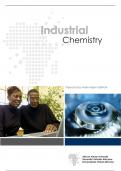
-
Industrial Chemical study
- Class notes • 168 pages • 2024
-
- R152,20
- + learn more
starts by defining industrial chemistry and then gives a view of the chemical industry, its position in the general economy, and its classification in terms of the chemical processes that characterize it. To enable the study of selected chemi cal processes, unit operations and unit processes, especially those that are relevant in later learning actvities, are then covered in Unit 2. With this background, it will be easy to study industrial inorganic and organic chemical industries. The ...
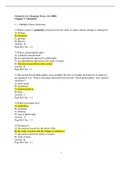
-
Chemistry for Changing Times, 12e (Hill)/ Chapter 1 Chemistry | 100% Correct Solutions.
- Exam (elaborations) • 26 pages • 2022
-
- R204,24
- + learn more
Chemistry for Changing Times, 12e (Hill) Chapter 1 Chemistry 1.1 Multiple Choice Questions 1) Which science is primarily concerned with the study of matter and the changes it undergoes? A) biol ogy B) chemistry C) geology D) physics Answer: B Page Ref: Sec. 1.1 2) What is natural philosophy? A) a belief in natural foods B) an experimental approach to philosophy C) an experimental approach to the study of nature D) theoretical speculation about nature Answer: D Page Ref: Sec 1.1 3) The ancient Gr...

How did he do that? By selling his study notes on Stuvia. Try it yourself! Discover all about earning on Stuvia



